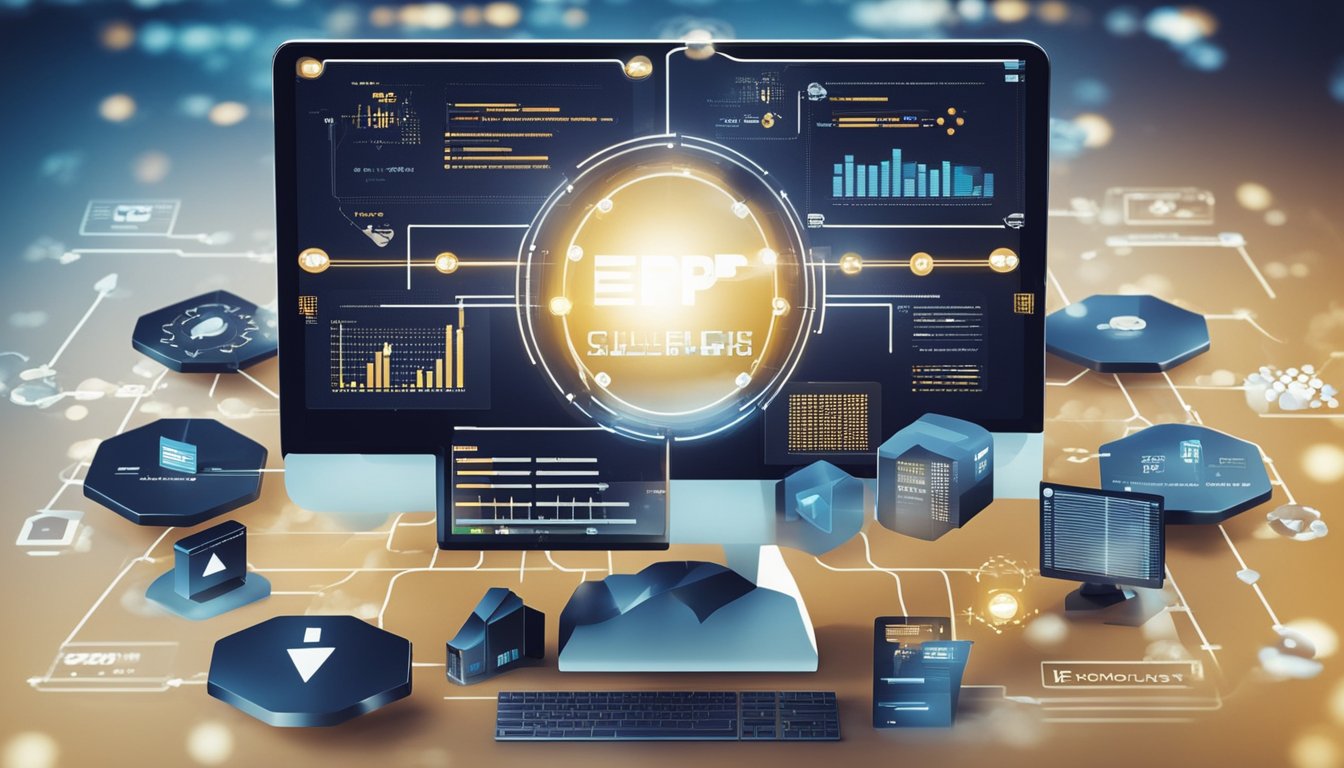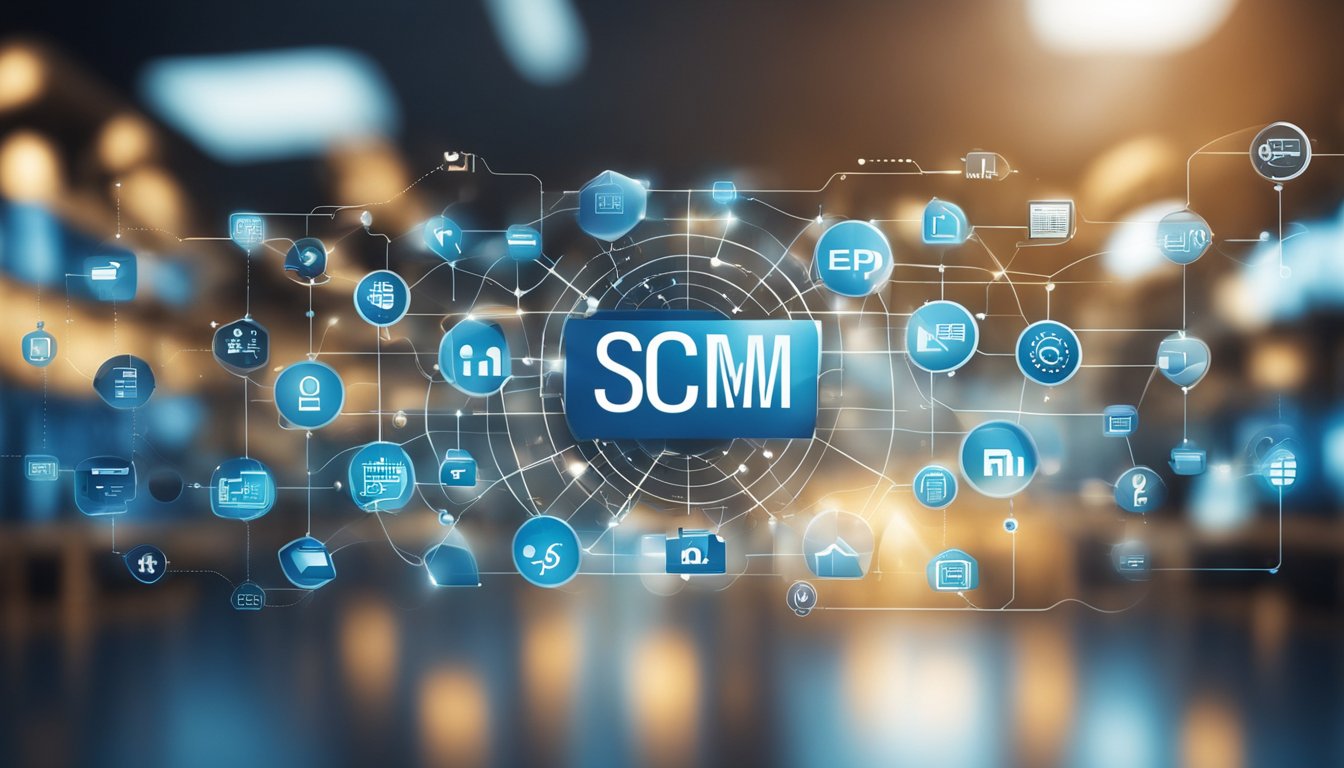Integrate Your Supply Chain Management Software with Your ERP System for Streamlined Operations
Integrating your supply chain management software with your enterprise resource planning (ERP) system can be a game-changer for your business. By linking these two critical systems, you can streamline your operations, improve efficiency, and reduce costs. However, it's important to understand the challenges and solutions in integrating these systems to maximize the benefits.

ERP systems are designed to automate and streamline essential business processes, such as finance, human resources, and inventory management. Meanwhile, supply chain management (SCM) software is focused on optimizing the flow of goods and services from suppliers to customers. Integrating these systems can help you gain a complete view of your business operations, from procurement to delivery.
The importance of integration cannot be overstated. By linking your SCM software with your ERP system, you can improve visibility into your supply chain, reduce manual data entry, and minimize errors. However, it's essential to understand the challenges and solutions in integration to ensure a successful implementation. In the following sections, we will explore the benefits of integrating your SCM software with your ERP system, the challenges you may face, and the solutions to overcome them.
Key Takeaways
- Integrating your SCM software with your ERP system can streamline your operations, improve efficiency, and reduce costs.
- The importance of integration cannot be overstated, as it can help you gain a complete view of your business operations and minimize errors.
- However, it's essential to understand the challenges and solutions in integration to ensure a successful implementation.
Understanding ERP and Supply Chain Management Software

As a business owner, I understand the importance of having a streamlined supply chain management system. That's why I believe that integrating your supply chain management software with your ERP system is crucial for your business's success.
ERP (Enterprise Resource Planning) systems are designed to manage and optimize various business processes, including finance, human resources, procurement, and supply chain management. On the other hand, supply chain management software (SCM) is designed to manage and optimize the flow of goods and services from the supplier to the end customer.
By integrating your SCM with your ERP system, you can achieve better visibility and control over your entire supply chain. This integration can help you to optimize your inventory levels, reduce lead times, and improve your overall supply chain performance.
One of the benefits of integrating your SCM with your ERP system is workflow automation. Cloud-based ERP systems automate the flow of data within and between departments, accelerating supply chain processes while greatly reducing manual effort. For example, the system can automatically alert purchasing groups if the inventory of key raw materials falls below predetermined thresholds.
Another benefit is better data management. Integrating your SCM with your ERP system allows you to have a single source of truth for all your supply chain data. This ensures that everyone in your organization has access to the same information, reducing the risk of errors and miscommunication.
In conclusion, integrating your supply chain management software with your ERP system is a smart move for any business looking to optimize its supply chain operations. By doing so, you can achieve better visibility and control over your entire supply chain, improve your supply chain performance, and ultimately drive business growth.
The Importance of Integration

As someone who has worked in the supply chain management industry for years, I can confidently say that integrating your supply chain management software with your ERP system is crucial for the success of your business.
Integration brings a host of benefits to your organization, including increased efficiency and productivity, faster growth, and a better experience for your customers. By seamlessly connecting your supply chain management software with your ERP system, you can achieve total visibility and end-to-end visibility of your supply chain operations, which is essential for making informed decisions and improving collaboration across your organization.
One of the primary benefits of integration is increased efficiency. When your supply chain management software and ERP system are seamlessly integrated, you can eliminate manual data entry and reduce the risk of errors. This, in turn, saves time and increases productivity, allowing your team to focus on more important tasks.
Integration also helps your organization grow faster. By automating processes and increasing efficiency, you can scale your operations more quickly and take advantage of new opportunities as they arise. This is especially important in today's fast-paced business environment, where companies need to be agile and adaptable to stay competitive.
In addition to these benefits, integration also improves the experience for your customers. With total visibility of your supply chain operations, you can provide accurate delivery times and ensure that products are delivered on time and in good condition. This, in turn, helps build trust with your customers and improves their overall experience with your brand.
Finally, integration is cost-effective. By eliminating manual data entry and reducing the risk of errors, you can save money on labor costs and avoid costly mistakes. This, in turn, improves your bottom line and helps your organization achieve long-term success.
In conclusion, integrating your supply chain management software with your ERP system is essential for improving efficiency, increasing productivity, and providing a better experience for your customers. With seamless integration, you can achieve total visibility and end-to-end visibility of your supply chain operations, which is crucial for making informed decisions and improving collaboration across your organization.
Challenges and Solutions in Integration

Integrating your supply chain management software with your ERP system can be a complex process that comes with its own set of challenges. However, recognizing these challenges and understanding how to address them can prepare your company for making the transition. In this section, I will discuss some of the most common challenges faced during integration and provide some solutions to help overcome them.
Operational Challenges
One of the biggest challenges faced during integration is getting employees skilled in technical system integration involved in the process. This can lead to delays, miscommunication, and even project failure. To address this, it is important to involve employees from both the SCM and ERP teams in the integration process from the beginning. This will help ensure that everyone is on the same page and that the integration is done efficiently.
Software Challenges
Another challenge is ensuring that the software being used is compatible with both the SCM and ERP systems. This is especially important when dealing with legacy systems that may not be as flexible as newer systems. To overcome this challenge, it is important to work with a technology partner that has experience in software integration and can provide middleware solutions to help bridge the gap between systems.
Financial and Compliance Challenges
Integrating SCM and ERP systems can also present financial and compliance challenges. For example, integrating inventory management can result in significant cost savings, but it can also lead to regulatory compliance issues if not done correctly. To address this, it is important to work with a technology partner that has experience in regulatory compliance and can help ensure that the integration is done in a compliant manner.
Real-Time Insights and Metrics
Integrating SCM and ERP systems can provide real-time insights and metrics that can help drive business decisions. However, this can also present challenges in terms of data management and reporting capabilities. To overcome this, it is important to work with a technology partner that has experience in business intelligence and can provide dashboards and reporting capabilities that can help make sense of the data.
Training and Employee Productivity
Integrating SCM and ERP systems can also present challenges in terms of training and employee productivity. To address this, it is important to provide adequate training to employees on the new system and to ensure that they have the necessary tools and resources to be productive. This can include providing access to training materials, offering support and guidance, and providing ongoing training and development opportunities.
Conclusion
Integrating your SCM and ERP systems can be a complex process that comes with its own set of challenges. However, by recognizing these challenges and understanding how to address them, you can prepare your company for making the transition. By working with a technology partner that has experience in software integration, regulatory compliance, and business intelligence, you can ensure that the integration is done efficiently, effectively, and in a compliant manner.
Looking Ahead: Future Trends in ERP and SCM Integration

As someone who has been working in the supply chain management industry for several years, I have seen firsthand the benefits of integrating ERP and SCM systems. However, as technology continues to evolve, it is important to stay ahead of the curve and understand the future trends in ERP and SCM integration.
One trend that is already making waves in the industry is the use of data and business intelligence (BI) to gain insights into supply chains. By using data analytics, companies can identify areas for improvement in their supply chain and make data-driven decisions to optimize their processes. As ERP solutions become more advanced, we can expect to see even more integration with BI tools to provide real-time insights into supply chain performance.
Another trend to watch is the use of artificial intelligence (AI) in ERP and SCM systems. AI has the potential to revolutionize supply chain management by automating repetitive tasks, predicting demand, and optimizing inventory levels. As AI technology continues to advance, we can expect to see more integration with ERP and SCM systems to provide even more accurate and efficient supply chain management.
In addition to data and AI, we can also expect to see more integration between ERP and SCM systems to provide end-to-end visibility into the supply chain. This means that companies will be able to track their products from the moment they are ordered to the moment they are delivered to the customer. This level of visibility will enable companies to identify bottlenecks in their supply chain and make adjustments to improve efficiency.
Overall, the future of ERP and SCM integration looks bright. As technology continues to evolve, we can expect to see even more advanced solutions that provide real-time insights, automate repetitive tasks, and provide end-to-end visibility into the supply chain. By staying ahead of these trends, companies can optimize their supply chain management processes and gain a competitive edge in their industry.
Frequently Asked Questions

What are the benefits of integrating SCM, CRM, and ERP systems in an organization?
Integrating SCM, CRM, and ERP systems in an organization can provide a wide range of benefits, including increased efficiency, reduced costs, improved customer satisfaction, and better decision-making capabilities. By integrating these systems, organizations can streamline their operations, eliminate redundant processes, and improve communication across departments.
How can ERP systems be related to supply chain management systems?
ERP systems can be related to supply chain management systems by providing real-time visibility into inventory levels, production schedules, and shipping information. This information can be used to optimize supply chain processes, reduce lead times, and improve customer service. Additionally, ERP systems can help organizations manage their suppliers, track supplier performance, and ensure that they are meeting quality standards.
What is the role of customer relationship management in ERP?
The role of customer relationship management (CRM) in ERP is to provide a centralized system for managing customer data, interactions, and transactions. By integrating CRM with ERP, organizations can improve their customer service, increase sales, and reduce costs associated with customer acquisition and retention. Additionally, CRM can provide valuable insights into customer behavior and preferences, which can be used to inform product development and marketing strategies.
What is the best ERP software for supply chain management?
There are many ERP software options available for supply chain management, and the best one will depend on the specific needs of your organization. Some popular options include SAP, Oracle, Microsoft Dynamics, and NetSuite. When selecting an ERP system for supply chain management, it is important to consider factors such as scalability, flexibility, ease of use, and integration capabilities.
Can you provide an example of how ERP is used in supply chain management?
One example of how ERP is used in supply chain management is through the use of demand planning and forecasting tools. By analyzing historical sales data and market trends, ERP systems can help organizations predict future demand for their products and plan their production schedules accordingly. Additionally, ERP systems can be used to track inventory levels, monitor supplier performance, and optimize shipping and logistics processes.
What is MRP and how is it used in supply chain management?
MRP stands for Material Requirements Planning, and it is a method used in supply chain management to determine the materials and components needed to manufacture a product. MRP systems use data from ERP systems to calculate the quantity and timing of materials needed for production, taking into account factors such as lead times, order quantities, and inventory levels. By using MRP, organizations can ensure that they have the right materials on hand at the right time, reducing waste and improving efficiency.









